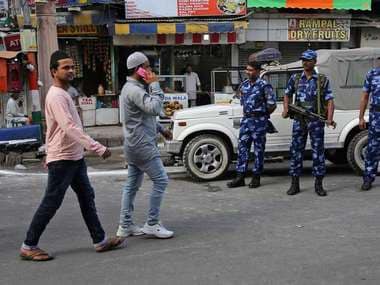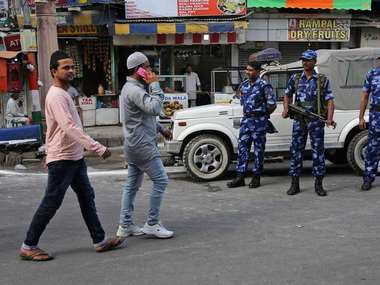Srinagar: In the second week of April, a fake document claiming to be a Supreme Court “order” directing the government to restore 4G internet in Jammu and Kashmir within 24 hours was widely shared on social media. The police had to issue a statement stating that the order, and subsequently, the cyber crime division registered a case and began investigations. Similarly, a morphed image was shared on social media showing the flag of Pakistan-occupied-Kashmir at the Lal Chowk Ghantaghar in Srinagar. The police registered a case and arrested the accused. Fake news was also circulated recently with regard to diagnosis of COVID-19 in Khandipora, Beerwah. [caption id=“attachment_7675171” align=“alignleft” width=“380”]  Representational image. AP[/caption] These are some examples of how social media was misused in recent days and became a breeding ground for rumour-mongering. Many of these rumours have been spread by anonymous accounts. This is happening at a time when the entire world is fighting to contain the novel coronavirus, and many people rely on social media to get updates about the disease. Senior officials in the administration, doctors and journalists also use social media to communicate and stay updated with the latest information. Even some media organisations have fallen prey to fake news. For instance, several news portals had carried the false claim about the Supreme Court’s order on 4G internet. However, they later issues apologies. The cyber crime division of the Kashmir Police has registered nine case regarding misuse of social media since the outbreak of coronavirus. At least 178 people have been arrested in the Valley for sharing fake news, videos, and pictures. Cases related to obscene publications, transmission of unauthorised content, cyber stalking, and obscene messages have also been reported recently. Suhail Naik, the head of Doctors Association Kashmir (DAK) has said that there have been several instances of people defaming doctors on social media due to personal animosity. Naik has demanded stringent action in such cases. Naik said, “Recently, a patient defamed a pediatrician on social media and even made his contact number public. This compromised the safetyy of the doctor, as he received many threats after the incident.” In another instance of misuse of social media, several fake accounts Jammu and Kashmir government spokesperson Rohit Kansal were created recently. Subsequently, screenshots from these fake accounts were also shared widely. Subsequently, Kansal tweeted —
#FakeAlert#Imitationnotflattery
— Rohit Kansal (@kansalrohit69) April 3, 2020
Am told that a number of FAKE ACCOUNTS of mine are being created. This can create confusion. PLEASE NOTE THAT I HAVE NO OTHER TWITTER ACCOUNT. These are difficult times. NO FAKES PLEASE . @diprjk
In another tweet, he said, “I am told that some Twitter handles impersonating my account are carrying some fake news regarding internet. I have not made any statement. Fake handles have been reported for action. We will also be taking action under cyber laws.” Kansal further said, “Some people want to disturb law and order by misusing social media. They create fake accounts, share fake videos and news. Security agencies are working to take action against such people,” he said. Tahir Ashraf, SP, Cyber Police Kashmir, said containing misuse of social media in the Valley is a challenging task. “There are about 1,000 social media accounts which are under our radar. Some may be operating from across the border. We are monitoring what content they are sharing and will take action accordingly,” he said. Ashraf claimed, “Some posts are aimed at destabilising the social fabric and creating law and order issues. Attempts are also being made to promote militancy via social media.” “We have also found certain users who misuse social media but are quite young. There is nothing against them in police records. We have contacted their parents and counseled them in this regard. We recently counseled over 25 youth and then allowed them to go home,” the SP said. The official appealed to people to abide by ethics and rules. “It is very important we should make proper use of social media. People should refrain from disseminating fake information," he said.


)

)
)
)
)
)
)
)
)



